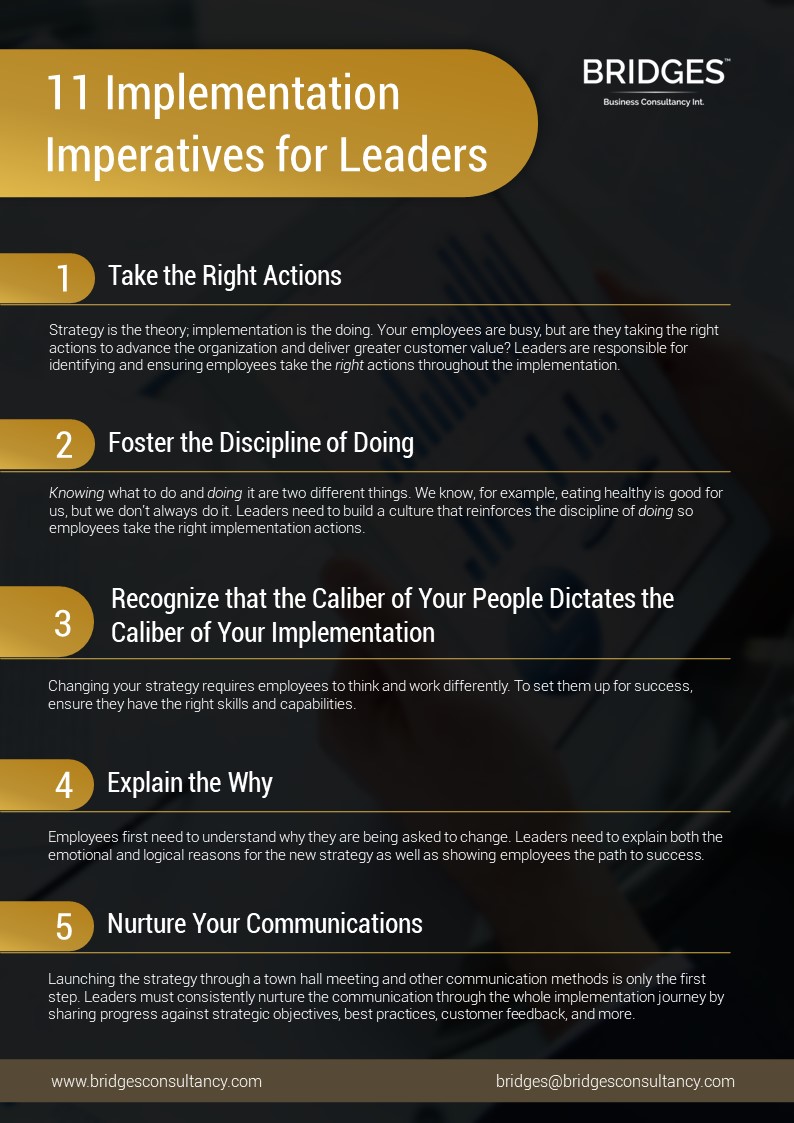Middle Managers’ Role in Strategy Implementation – The Lynchpin of Success
(One-day workshop)
A results oriented workshop designed to enhance middle managers’ capabilities in translating strategy into actions.
Introduction
Not enough attention is paid to the role of middle managers in implementing strategy, which contributes to its poor success rate.
Senior leaders are responsible for crafting strategy and middle managers are the lynchpin of success. But they are often ignored.
This course is designed to enhance and reinforce middle managers’ capabilities in translating strategy into the business. It provides powerful techniques, tips and a framework to support the middle managers; that is often missing.
The course was initially developed and designed in 2010 as a public offering for Singapore Management University. It continues to be conducted every year at the University and for our clients due to its popularity, easy to adopt tools and contributing success to assisting organizations in their implementation.
Middle managers in strategy implementation are often called the thermal layer as they absorb both the senior managers inputs and the frontline feedback. They are the lynchpin who translate the strategy into what it means for the frontline and also provide the feedback to senior leaders on the progress being made.
The opening of the course immediately addresses the question that middle managers can influence change and explains how they can do it. The participants then receive 6 powerful tips that allows them to support and drive the implementation. In the second part of the morning the course explains the eight areas for excellence in , that make up the Implementation Compass™ framework.
In the afternoon the participants assess themselves in their digital maturity. The majority of the afternoon then focuses on the Harvard listed DBS bank case study, written by the course facilitator.
Course Outline
- How Middle Managers Influence Change
Middle managers can make the difference between success and failure; therefore, ignoring their role in implementing the strategy can be catastrophic.
The workshop opens by addressing the question, “Can middle managers influence change and if yes, ‘how’?” It explains how they can create success by using their influence to change attitudes and actions, and emphasizes that it takes small changes, by lots of people that creates big change.
- Six Tips for Success
Middle managers need to explain to their teams why people should work differently, as by definition a new strategy means working differently.
From Bridges’ (the facilitators company) research over the years and their work with clients, six powerful tips have been developed. They include for example, “Less is More”, “Small Actions” and “Give People a Choice”. The tips are explained using research, puzzles, stories and examples.
- Understanding the Implementation Challenge
A framework is needed to guide people through the implementation journey and identify the right actions.
Organizations are guilty of repeating the same mistakes when implementing strategy. This session explains why more implementations fail than succeed. It shares the framework used by organizations around the world, called the Implementation Compass™. This framework explains the eight areas required for excellence in execution through stories and examples.
- Digital Maturity Assessment
Many implementations today involve digitalization. This online assessment allows participants to understand which of the three stages they are at in their digital maturity – Reacting, Embedding or Strategizing.
More importantly, immediately upon finishing the assessment they receive a report with recommendations on how they can enhance their digital maturity by reading articles, listening to podcasts or watching videos.
- Lessons Learned from DBS Case Study
Case studies are an integral part of any participant’s learning. Participants receive the case study as a pre-reading assignment.
This final session helps participants learn from DBS Bank about how they implemented their strategy and highlight all the key learning from the of course. Participants share and discuss learning and ideas. They then apply the key lessons to their own organization.
DBS bank successfully transformed to the world’s best bank by leveraging digitalization. The leaders created a purpose that aligned the whole organization and worked with their middle managers to drive the right actions across every part of the bank.
Who Should Attend
This course is suitable for supervisors and middle managers who wish to enhance their skills in:
- Translating the strategy into day-to-day actions.
- Guiding employees through the transition.
- Driving the right actions across the organization.
- Providing feedback on the implementation’s progress to people both above and below them.
The Facilitator:
Robin Speculand is a recognized pioneer and expert in strategy and digital implementation. He is driven to transform strategy implementation by inspiring global leaders to adopt a different mindset and approach. The founder of three companies, Robin is CEO of Bridges Business Consultancy Int and co-founder of the Strategy Implementation Institute and Digital Leadership Specialists. A TEDx presenter and Thinkers50 nominee, he is a facilitator for IMD,NUS, Duke CE, and SMU, and part of Top 30 Global Guru. As a best-selling author, he has written seven books including his most recent ones: World’s Best Bank: A Strategic Guide to Digital Transformation (translated in to six languages).






